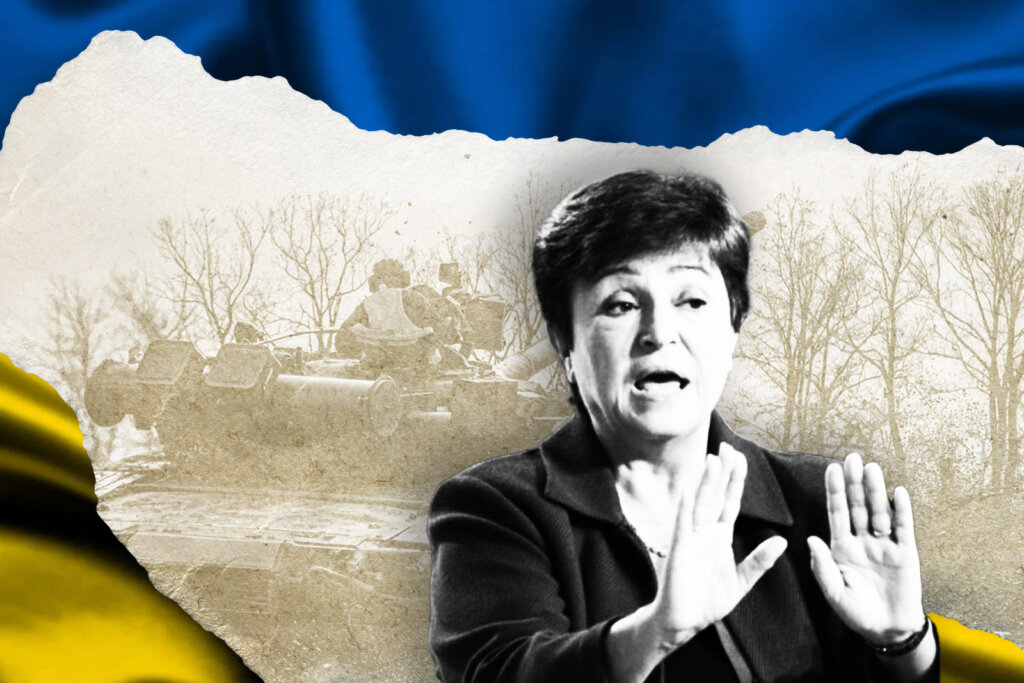- Experts say Russia has been preparing for years to resist international sanctions.
- Both international financial organizations are ready to provide immediate support to Ukraine and other neighboring countries.
- The Bank of Russia indicated that it will strongly support the four banks sanctioned by the US and the European Union.
The representatives of the International Monetary Fund and the World Bank warned that Russia’s invasion of Ukraine will affect the global economic recovery, while pointing out that the government of Vladimir Putin had been preparing to resist international sanctions.
The director of the IMF, Kristalina Georgieva, said that she was “deeply worried” due to the repercussions that the bombing of Ukraine will have and pointed out that this warlike conflict “adds a significant economic risk for the region and the world”.
While assessing the economic impact of the war, the Fund “will be ready to support our members when necessary,” Georgieva said.
The Washington-based international lending agency is preparing to disburse $2.2 billion to Ukraine in financial assistance. This loan program, which will end in June, seeks to support the country under Russian fire to face the damage caused by the incursion of Russian troops.
Georgieva also said that if necessary the institution is willing to provide help to other countries that are affected by the conflict.
World Bank will support Ukraine
For his part, the president of the World Bank (WB), David Malpass, said through his Twitter account that he was “deeply saddened and horrified by the devastating events in Ukraine, which will have a far-reaching economic and social impact.”
The organization "is preparing options for great support to the people of Ukraine and the region, including immediate budget support," Malpass added.
The outbreak of the war in Ukraine caused a sharp rise in gas and oil prices that exceeded 100 dollars a barrel. In addition, it generated a fall in the stock markets of Europe, Asia and, to a lesser extent, on Wall Street, which recovered at the end of Thursday’s session.
In an upcoming update, the IMF is expected to cut growth forecasts for the world economy. In January, the agency estimated a reduction in global GDP to 4.4% for this year, half a point below the previous October forecast. Fundamentally, as a consequence of the effects of the latest wave of the covid-19 pandemic.
Russia was prepared for sanctions
As part of the West’s response to Russia, US President Joe Biden and British Prime Minister Boris Johnson announced a package of economic sanctions effective immediately.
The sanctions include the freezing of assets of four of the main Russian banks VTB, Otkritie, Novikombank and Sovcombank. As well as the suspension of high-tech exports to Russia, among others.
But, Moscow had already been preparing to face the sanctions for several years. To do this, he accumulated cash, gold and cryptocurrencies in a reserve fund for the war and has a very low level of debt.
"The Bank of Russia and the Russian government will provide all necessary assistance to banks sanctioned by Western states" with rubles and foreign currencies, the financial institution said in a statement released on Friday.
"All operations of these banks will be carried out in rubles and proper services will be provided to all clients as usual," the statement said.
This "is not a coincidence," said Elina Ribakova of the Institute of International Finance. "I think it's a very important part of what we call the strength of the Russian strategy," she said.
On the Flipside
- With this piggy bank, the Russian government hopes to mitigate the effects of US and European sanctions.
- In the meantime the US Federal Reserve could delay or downplay the expected interest rate hike scheduled for March.
Although analysts predict that if the conflict in Ukraine causes a very serious imbalance in the supply of raw materials and prices rise to critical levels, it may have to act more aggressively.





